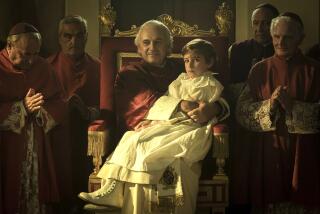Movie Reviews : ‘Fairy Tale’ Questions Nature of Identity
- Share via
Gyula Gazdag’s “A Hungarian Fairy Tale” (at the Nuart through Tuesday) is one of those magical films in which events are totally unexpected, yet responses to them seem exactly right.
In this dark political satire and fable of the absurd that questions the nature of identity, everybody is confronted with increasingly perplexing and surreal circumstances. Gazdag’s grasp of human nature is as impressive as his style, and his imagination is nothing short of dazzling. “A Hungarian Fairy Tale” will surely rank among the year’s best films.
One of the most critical and talented of the younger generation of Hungarian film makers, Gazdag begins with a droll tone designed to throw us off balance (where we remain for the rest of the film). Carried away by a production of Mozart’s “The Magic Flute,” a lovely young woman with a Mona Lisa smile (Maria Varga) embarks upon a night of love with a stranger that results in her giving birth to a baby boy whom she calls Andris. The entire film turns upon a curious quirk in Hungarian law that requires that every child must have a father listed on his birth certificate. If the father is unknown, then his identity must be invented.
Suddenly, the now-adolescent Andris (David Vermes) must seek out this non-existent father and is plunged into adventure. At the same time, the clerk (Frantisek Husak), who helped Andris’ mother come up with a name, occupation and address for the boy’s father, snaps and starts destroying piles upon piles of records, which propels him into his own odyssey.
On one level Gazdag, who wrote his film with Miklos Gyorffy, takes a bemused look at the workings of fate; on another, he skewers bureaucratic society in which the individual has no existence apart from his papers and official records. Watching this film at first stirs up all those paranoid fears one has of losing one’s wallet, but Gazdag takes us much farther: In a spirit of anarchy, he argues that our only real hope is somehow to escape from society entirely. “A Hungarian Fairy Tale” depicts the warmest of impulses at constant odds with the coldest of rules and regulations.
Shot in glorious black-and-white and accompanied throughout by themes from “The Magic Flute,” “A Hungarian Fairy Tale” moves swiftly from one keenly perceptive and dryly witty vignette to the next, which serves to anchor Gazdag’s flights of fancy in everyday reality. Vermes, who has the look of a 12-year-old Brando, sustains the film with his heart-wrenching portrayal of the bewildered yet increasingly resilient Andris. The gaunt Husak is engaging as the similarly single-minded clerk, and late in the film Eszter Csakanyi adds her strong maternal presence as a woman determined to help Andris even if he does point a rifle at her. The concentration of these actors and others is unflagging, and the world of the ironically titled “A Hungarian Fairy Tale” (Times-rated Mature for complex, intense themes) into which they and Gazdag take us is too familiar for comfort.
More to Read
Only good movies
Get the Indie Focus newsletter, Mark Olsen's weekly guide to the world of cinema.
You may occasionally receive promotional content from the Los Angeles Times.






